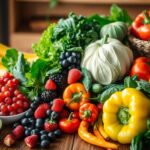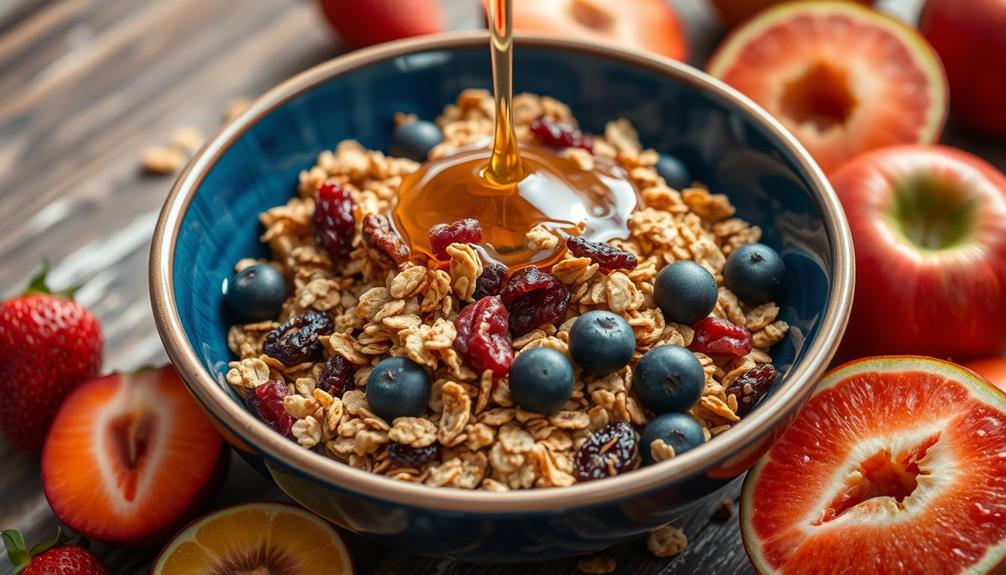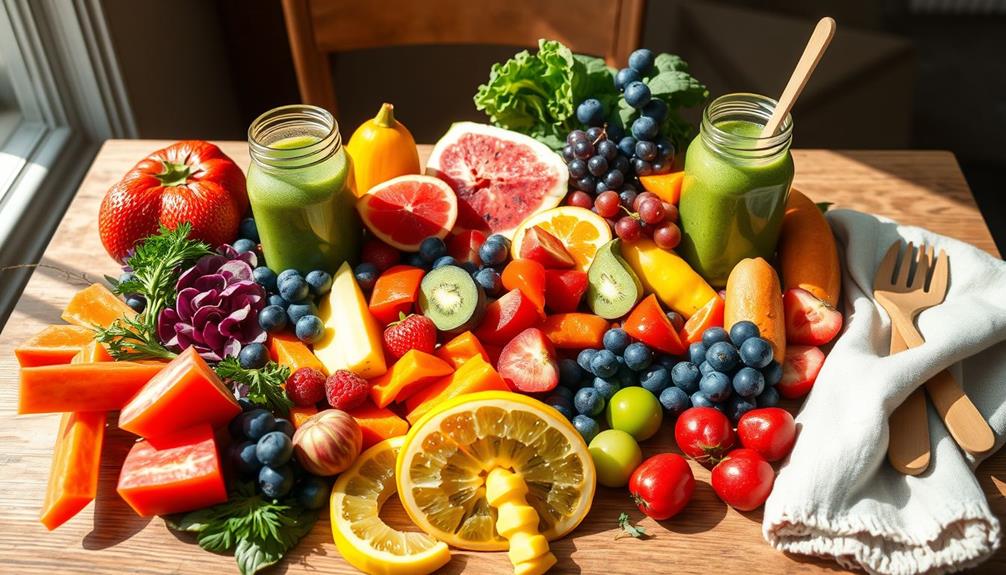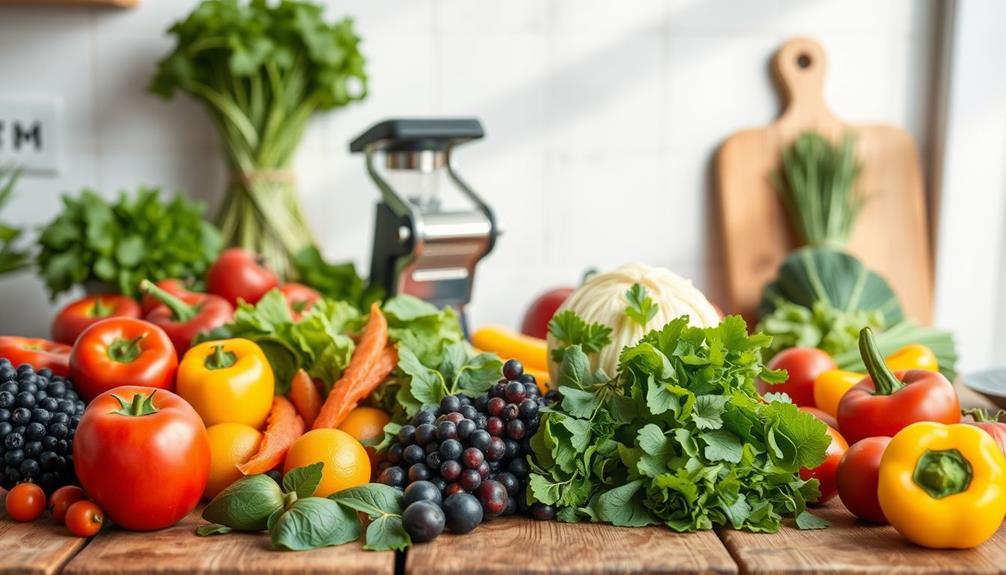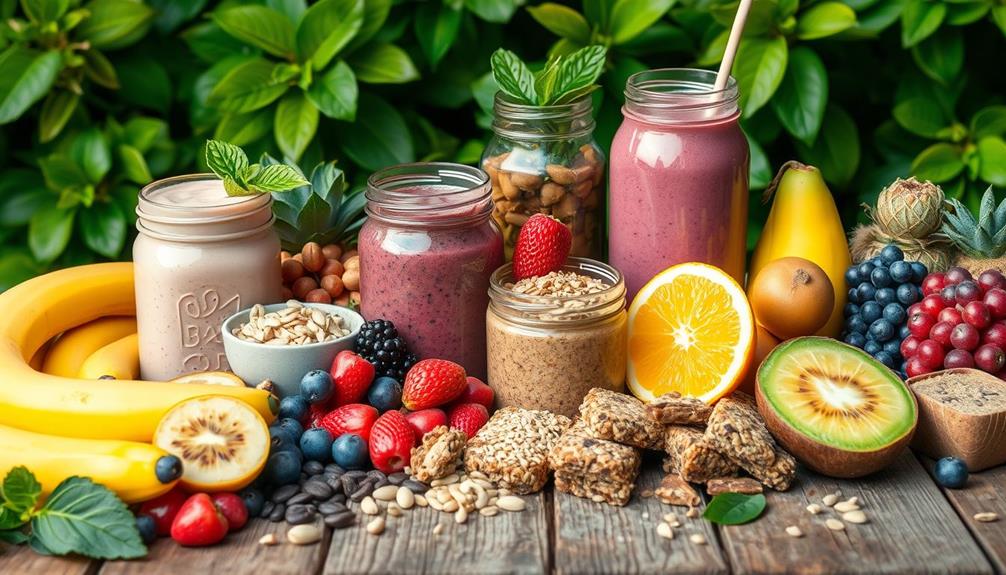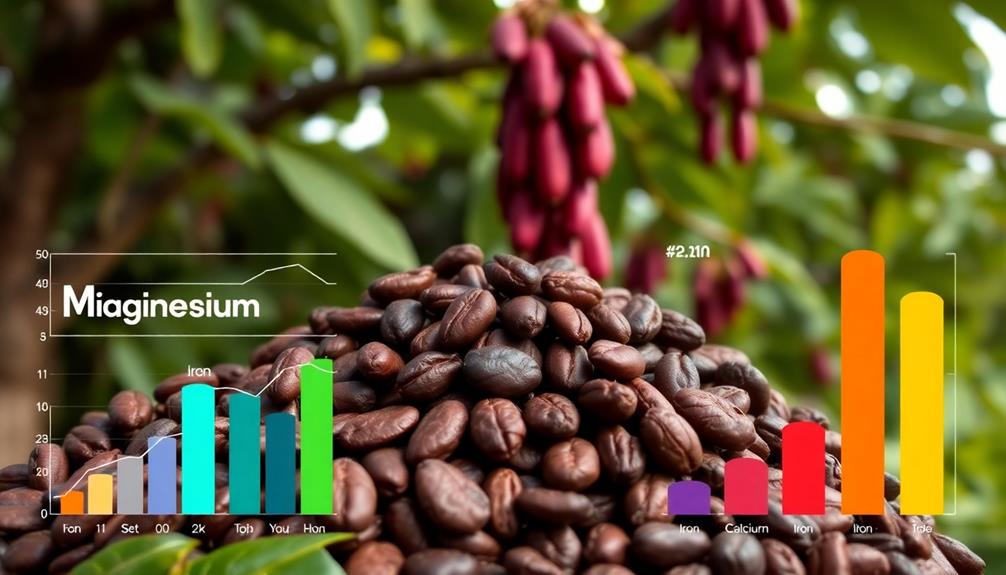You can include raw foods in your diet while breastfeeding, but you need to be cautious. Raw seafood and undercooked meats can carry harmful bacteria, increasing your risk of infections like Listeria and Salmonella. These can affect both you and your baby. Focus on raw fruits, which offer essential nutrients and hydration. Guarantee safe food handling practices, like washing hands and using separate cutting boards. Introduce new raw foods slowly, watching for any reactions in your baby. Balancing your diet with variety is important for overall health. There's much more to reflect on, so keep exploring your options!
Key Takeaways
- Avoid raw seafood and undercooked meats to reduce the risk of harmful bacteria and parasites that can affect both mother and baby.
- Breastfeeding mothers are more susceptible to infections like Listeria and Salmonella, making safe food handling practices essential.
- High-mercury fish should be avoided to protect the baby's brain and nervous system development during breastfeeding.
- Introduce raw foods gradually and monitor the baby for any allergic reactions or discomfort, keeping a food log for reference.
- Balance cultural dietary restrictions with evidence-based nutrition, incorporating a variety of nutrient-rich foods for optimal health.
Understanding Raw Food Safety
Understanding raw food safety is vital for breastfeeding mothers who want to incorporate these foods into their diet. Raw seafood and undercooked meats can harbor harmful bacteria and parasites, increasing your risk of foodborne illnesses.
As a breastfeeding mother, you need to be particularly cautious since infections from pathogens like Listeria can lead to severe complications for both you and your infant. Additionally, it's important to be aware of the potential side effects and interactions of certain foods, including raw options, that may affect your health and your breastfeeding experience.
Practicing safe food handling is imperative. Always clean surfaces and utensils thoroughly before preparing or consuming raw foods.
To minimize risks, it's wise to consult reputable sources before enjoying sushi or raw seafood. Choosing these foods from certified establishments can help guarantee safety and reduce your chances of encountering harmful bacteria.
It's also important to avoid high-mercury fish while breastfeeding. Mercury can pass into your breast milk and affect your baby's development.
Health Risks of Raw Foods

Raw foods can pose significant health risks for breastfeeding mothers, especially when it comes to seafood and undercooked meats. Consuming raw fish can expose you to harmful bacteria and parasites that lead to foodborne illnesses like Listeria and Salmonella.
As a breastfeeding woman, you're 10-20 times more susceptible to these infections, which can have severe consequences for both you and your nursing infant. Individuals with Borderline Personality Disorder (BPD) may experience heightened emotional responses, making it even more essential to maintain a healthy diet during breastfeeding.
Listeriosis, a serious infection linked to raw seafood, can lead to complications such as miscarriage, preterm labor, and low birth weight in infants. This highlights the need for food safety during breastfeeding.
Additionally, you should be cautious about high-mercury fish, commonly consumed raw, as they can adversely affect your infant's brain and nervous system development. Species like shark and swordfish should be avoided entirely.
To minimize these health risks, prioritize proper food handling practices. Always source seafood from reputable suppliers and guarantee thorough cooking before consuming.
While raw foods may seem appealing, the potential dangers far outweigh the benefits during this essential time for both you and your baby.
Nutritional Benefits of Raw Fruits

Raw fruits pack a punch when it comes to essential nutrients, providing you and your breastfeeding baby with crucial vitamins and minerals.
Their high water content keeps you hydrated, which is key for maintaining milk production.
Additionally, incorporating high levels of antioxidants from raw fruits can boost your immune health and aid digestion, making them a great addition to your diet.
Plus, the antioxidants and fiber in these fruits can boost your immune health and aid digestion, making them a great addition to your diet.
Rich in Essential Nutrients
Incorporating a variety of fruits into your diet while breastfeeding can greatly enhance your nutritional intake. Raw fruits are packed with essential nutrients, including important vitamins and minerals like vitamin C and potassium, which are critical for your health and your baby's development. Their high antioxidant content, featuring flavonoids and carotenoids, plays a significant role in supporting your immune system, helping you fend off illnesses during this demanding time.
Additionally, certain raw fruits can be beneficial for oral health, as natural compounds in fruits like eucalyptus oil can help maintain your overall well-being.
The hydration benefits of raw fruits can't be overlooked, as their high water content aids in maintaining ideal fluid levels, an important aspect of breastfeeding. Additionally, the dietary fiber and natural enzymes found in these fruits can support digestive health, helping to ease postpartum recovery and reduce the risk of constipation.
As a breastfeeding mother, you have increased energy needs, and raw fruits are an excellent snack option. They're low in calories but high in essential nutrients, making it easy to satisfy your hunger without compromising your health.
Hydration and Fiber Content
Hydration and fiber are essential components of a breastfeeding mother's diet, and fruits excel in providing both. Raw fruits are packed with hydration, supplying the essential fluids you need to maintain adequate fluid intake while supporting your milk production. Staying hydrated is vital, especially as your body works hard to nourish your baby.
Additionally, incorporating herbal teas like chamomile and ginger can complement your hydration needs and may also alleviate any menstrual discomfort you might experience during this time, as they're known for their soothing properties best herbal tea for period pain.
Many raw fruits, like apples and pears, are also rich in dietary fiber, which aids in digestion and helps prevent constipation—a common issue for new mothers. Including a variety of fruits in your diet not only boosts hydration but also enhances the nutrient-rich profile of your meals.
Fruits such as berries and oranges aren't just hydrating; they're loaded with vitamins C and A, important for your health and your baby's immune development.
Moreover, consuming a diverse range of raw fruits can positively influence the flavor of your breast milk. This can help your infant develop a preference for healthy foods as they grow.
Antioxidant Properties and Benefits
A colorful assortment of fruits can greatly boost your diet while breastfeeding, thanks to their rich antioxidant properties. Raw fruits, loaded with vitamin C and flavonoids, help protect your cells from oxidative stress, supporting your immune health as a breastfeeding mother. This support is essential for both you and your infant during this vulnerable time.
Additionally, understanding the caffeine content in various foods and beverages can help you make informed choices that benefit both your health and breastfeeding journey, especially when paired with a variety of brewing methods.
Incorporating raw fruits into your meals can also increase your dietary fiber intake, aiding digestion and potentially reducing postpartum constipation, a common concern for new mothers. The fiber found in fruits not only promotes regularity but also helps you feel fuller longer, making it easier to manage your postpartum weight.
Moreover, the antioxidant properties of raw fruits have been linked to a lower risk of chronic diseases, making them an integral part of your long-term health strategy. Berries and citrus fruits, in particular, stand out for their high levels of polyphenols, which may enhance cardiovascular health and cognitive function for both you and your baby.
Eating a variety of raw fruits guarantees you're getting a diverse range of micronutrients and phytochemicals, which can support your nutritional needs and help develop your infant's immune system.
Cooking Guidelines for Animal Products

Safety is paramount when it comes to cooking animal products while breastfeeding. You should avoid raw meats and seafood to protect yourself and your baby from harmful bacteria and parasites that can lead to food poisoning.
Proper diet and cleanliness are vital for both you and your baby, similar to how hamster care emphasizes regular health checks and safe food choices. It's important to cook animal products to the right cooking temperatures to guarantee they're safe to consume. For poultry, aim for an internal temperature of 165°F, ground meats should reach 160°F, and fish needs to be cooked to at least 145°F.
If you enjoy deli meats, make sure to reheat them until steaming to eliminate any potential Listeria bacteria. When it comes to cold seafood, such as sushi, only indulge in options from reputable sources to minimize the risk of foodborne illnesses.
Practicing safe food handling is imperative in your breastfeeding diet. Always wash your hands thoroughly and avoid cross-contamination when preparing meals.
Monitoring Your Baby's Reactions

When you start introducing raw foods into your diet while breastfeeding, it's vital to keep a close eye on your baby's reactions. Monitoring is significant because some raw foods can contain allergens that may pass through your breast milk.
Understanding financial considerations for elderly care is also important for new parents as they navigate dietary choices. Look for signs of allergies or discomfort in your baby, such as rashes, gastrointestinal distress, or unusual fussiness.
To help identify potential triggers, keep a food log detailing what you consume and any corresponding symptoms observed in your baby. If your little one exhibits symptoms like diarrhea, vomiting, or skin reactions after you've eaten a specific raw food, it's prudent to avoid that food in the future and consult a healthcare provider.
Additionally, regularly assess your baby's growth and development milestones, as any adverse reactions to your diet can impact their overall health.
Being proactive about monitoring your baby's reactions helps guarantee their well-being while you explore new dietary choices. Adjust your eating habits accordingly, and remember that your baby's health should always come first.
Safe Food Handling Practices

How can you guarantee the raw foods you consume while breastfeeding are safe for both you and your baby? It all starts with safe food handling practices. First, wash your hands thoroughly before and after handling raw food to prevent cross-contamination. This is essential in reducing the risk of foodborne illnesses.
Additionally, be mindful of your overall health and any personal risk factors that might affect your dietary choices, as mammography aims to detect breast cancer early and maintaining a healthy diet can be part of a preventative strategy.
Next, use separate cutting boards for raw meats and other food items. This minimizes the chance of pathogens spreading from one surface to another. When it comes to raw seafood, like sushi, always choose from reputable sources that follow safety certifications and proper handling practices.
Storing raw fish and seafood at proper temperatures is critical. Refrigerate them within two hours to inhibit bacterial growth. If you're consuming undercooked meats, be aware of the recommended cooking temperatures—poultry should reach 165°F, while ground meats should hit 160°F. Following these guidelines greatly lowers the risk of infections from foodborne pathogens.
Cultural Dietary Restrictions
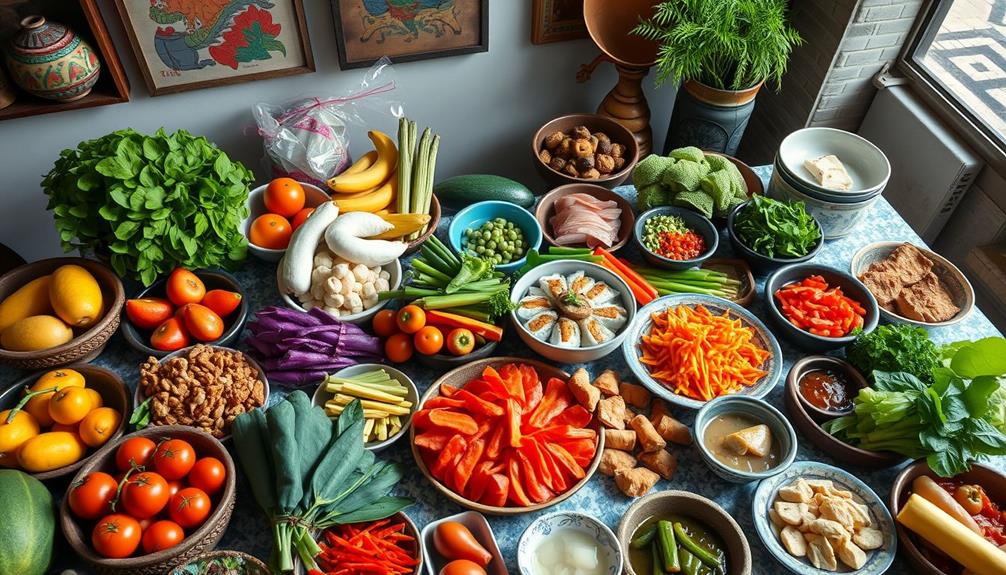
Your cultural beliefs can shape what you choose to eat while breastfeeding, often leading you to avoid certain foods like raw seafood or spicy dishes.
Many mothers restrict their diets based on traditional practices, which can sometimes lack scientific backing.
It's important to reflect on how these dietary choices may impact your overall health and milk supply, as well as to seek guidance on financial implications related to breastfeeding and nutrition.
Understanding these cultural dietary restrictions is important for making informed choices that support both your health and your baby's.
Cultural Beliefs and Practices
Cultural beliefs play an essential role in shaping dietary practices for breastfeeding mothers, often leading to significant food restrictions. Many mothers may avoid raw foods, spicy dishes, or even caffeine due to traditional customs.
For example, in some Asian cultures, the consumption of cold foods is avoided, while Korean mothers might steer clear of spicy meals. These dietary restrictions often arise from concerns about allergies, colic, and milk production.
A striking 84.1% of mothers limit their diets based on unclear reasons or vague worries, which highlights the strong influence of cultural perceptions on food choices. Younger mothers, particularly those under 40, report feeling greater discomfort with these restrictions, suggesting that societal pressures weigh heavily on their experiences.
Despite these widespread practices, the literature reveals a lack of scientific evidence backing many of these cultural dietary restrictions. This gap emphasizes the need for evidence-based practices to guide breastfeeding mothers in making informed dietary choices.
Understanding your cultural beliefs is important, but it's equally essential to take into account scientifically supported information when determining what to eat while breastfeeding.
Commonly Avoided Foods
Many breastfeeding mothers restrict a variety of foods based on cultural beliefs and health concerns. You might find that foods like caffeine, spicy dishes, and raw items, such as sushi or raw fish, are commonly avoided. This is often influenced by vague worries about allergies or colic, with a surprising 84.1% of mothers steering clear of certain foods without specific reasons.
In some cultures, especially in many Asian traditions, cold foods are traditionally avoided during breastfeeding, as they're believed to affect your health and milk production.
Younger mothers, particularly those under 40, frequently express discomfort regarding these dietary restrictions, feeling pressured by cultural norms. Notably, while many foods are avoided, research indicates a lack of scientific basis for these restrictions, underscoring the need for evidence-based dietary guidance.
It's crucial to reflect that not all raw foods pose a risk; for instance, fresh fruits and vegetables can be beneficial. Ultimately, striking a balance between cultural practices and informed choices can help you navigate your dietary needs during breastfeeding while ensuring your baby's health.
Tips for a Balanced Diet

Maintaining a balanced diet while breastfeeding is essential for both your health and your baby's development. Focus on incorporating a variety of nutrient-rich foods into your meals. Prioritize fruits and vegetables, whole grains, and lean protein sources like chicken, fish, and eggs. These foods support Maternal Nutrition and help you meet your increased energy needs, which can be around 500 calories a day.
Develop healthy eating habits by including calorie-dense foods like nuts and seeds. Essential nutrients such as vitamins D, A, E, C, B12, selenium, and zinc are fundamental for your well-being and your baby's growth.
Don't forget the importance of hydration—drink to thirst rather than forcing excessive fluid intake.
Healthy fats are also significant, especially polyunsaturated fatty acids like DHA from fish, which benefit both you and your infant. However, avoid certain foods high in trans fatty acids, as they can negatively impact your health.
Frequently Asked Questions
Can a Breastfeeding Mom Eat Raw Food?
You can eat raw food while breastfeeding, but be cautious. Choose reputable sources, avoid high-mercury fish, and practice good food safety. This way, you minimize risks for yourself and your breastfeeding infant.
What Should a Breastfeeding Mother Avoid Eating?
When steering your diet, avoid high-mercury fish, undercooked meats, and seafood. Limit alcohol and caffeine, and be cautious with allergens unless allergies run in the family. Prioritize safety for both you and your baby.
What Is Forbidden to Eat While Breastfeeding?
While breastfeeding, you should avoid raw meats, seafood, and undercooked eggs due to foodborne illness risks. Limit high-mercury fish, alcohol, and caffeine, and monitor potential allergens to guarantee your baby's health and safety.
Is It Okay to Eat Sushi While Breastfeeding?
You might think sushi's a thrilling culinary adventure, but when breastfeeding, it's vital to tread carefully. Opt for low-mercury varieties and always choose reputable places to guarantee both you and your baby stay safe.
Conclusion
In summary, while you can enjoy raw foods while breastfeeding, it's essential to prioritize safety and balance. The right fruits and veggies can provide incredible nutrients for both you and your baby, but you must be cautious about the risks. Always handle food properly and watch for any reactions from your little one. By following these guidelines, you can create a breastfeeding experience that's as nourishing as a superfood-powered rocket ship, propelling you both to health and happiness!





